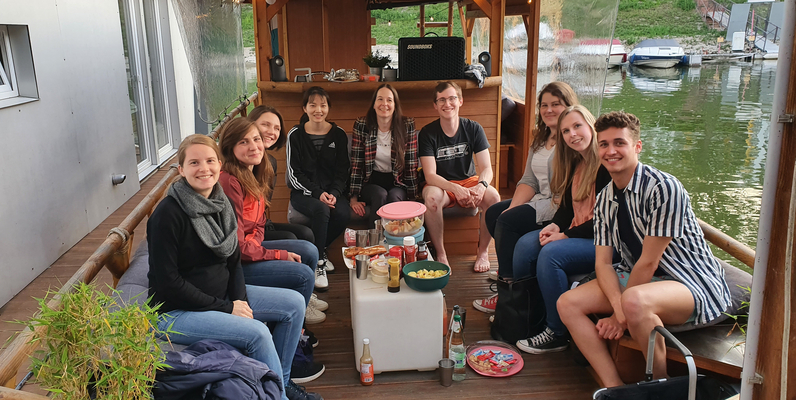Projects Offered
Roopesh Anand Petra Beli Petra Beli/Vassilis Roukos Dorothee Dormann René Ketting Katja Luck Carlotta Martelli Christof Niehrs_Ageing Christof Niehrs_Bioinfo Christof Niehrs_4R Sandra Schick Helle Ulrich Andreas Wachter Johannes Mayer_DCMem Johannes Mayer_DCSkin Wolfram Ruf Tim Sparwasser Uwe WolfrumGene regulation by chromatin remodellers during development and disease
2 PhD projects offered in the IPP summer call Molecular Mechanisms in Genome Stability & Gene Regulation
Scientific Background
Genomic DNA is highly compacted into chromatin in order to fit into the nucleus of a cell. The packaging further provides a regulatory layer for DNA accessibility and therefore all DNA-dependent processes, such as transcription, DNA repair or replication. ATP-dependent chromatin remodellers can modulate the accessibility by moving or evicting nucleosomes. One class of these remodellers are the BAF complexes, very large multi-protein complexes existing in many different configurations in human cells. Their importance is highlighted by the fact that mutations in genes coding for these complexes are found in more than 20% of all human cancers and are frequently causative for developmental diseases. For example, heterozygous mutations in several genes encoding BAF subunits are often the cause of neurodevelopmental disorders such as Coffin-Siris-Syndrome, Nicolaides-Baraitser-Syndrom or Autism spectrum disorder. They manifest as brain abnormalities, intellectual disabilities and other physical aberrations. The molecular and cellular consequences of these mutations are hardly known so far. Therefore, understanding the cell type-specific composition and function of these complexes in the development of the brain as well as the cellular changes caused by the mutation of a subunit is of great importance for the development of therapeutics against these common BAF-mutated diseases.
PhD project: Gene regulation by chromatin remodellers during neurodevelopment and related disorders
BAF complexes control the accessibility of cell type-specific genomic gene regulatory regions and are therefore of great importance for developmental processes, cell fate transitions during differentiation and cell maintenance. To understand their physiological role during human brain developmental processes and unravel disease-associated molecular alterations caused by mutations in genes encoding subunits of these complexes, we will implement stem cell differentiation into brain organoids combined with molecular perturbation tools such as CRISPR/Cas9 and chemically induced protein degradation. This will allow us to model developmental diseases and unravel the physiological role of BAF subunits and specific BAF complexes in human developmental processes. With the help of bulk and single-cell genomics, proteomics, molecular biology, screening and imaging approaches, we will then dissect the cellular and molecular consequences upon loss of selected BAF subunits. This will provide novel insights into these diseases as well as the function of the BAF complexes and their subunits in developmental processes.
We are therefore looking for a highly motivated PhD student who is experienced in the lab, enthusiastic about science especially with regard to neurodevelopmental processes, gene regulation and epigenomics and has a strong interest in tackling scientific questions in an interdisciplinary way. Computational skills are an asset but not compulsory.
In addition, we are looking for a computational PhD students experienced in NGS data analysis, beneficially for bulk and single cell experiments, data integration and visualization.
The project is funded by an ERC starting grant.
If you are interested in the wetlab position of this project, please select Schick (Bench) as your group preference in the IPP application platform.
If you are interested in the computational position of this project, please select Schick (Comp) as your group preference in the IPP application platform.
Publications relevant to the project
Schick S, Rendeiro AF, Runggatscher K, Ringler A, Boidol B, Hinkel M, Májek P, Vulliard L, Penz T, Parapatics K, Schmidl C, Menche J, Boehmelt G, Pentronczki M, Müller AC, Bock C, Kubicek S (2019) Systematic characterization of BAF mutations provides insights into intracomplex synthetic lethalities in human cancers. Nature Genetics 51: 1399-1410 Link
Schick S, Grosche S, Kohl KE, Drpic D, Jaeger MG, Marella NC, Imrichova H, Lin JMG, Hofstätter G, Schuster M, Rendeiro AF, Koren A, Petronczki M, Bock C, Müller AC, Winter GE, Kubicek S (2021) Acute BAF perturbation causes immediate changes in chromatin accessibility. Nature Genetics 53: 269-278 Link
Varga J, Kube M; Luck K, Schick S (2021) The BAF chromatin remodeling complexes: structure, function, and synthetic lethalities. Biochem Soc Trans 49 (4): 1489-1503 Link
